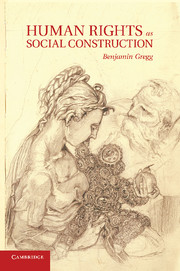Book contents
- Frontmatter
- Contents
- Acknowledgments
- Introduction
- Part I This-Worldly Norms: Local Not Universal
- 1 Human Rights
- 2 Human Rights
- 3 Generating Universal Human Rights out of Local Norms
- Part II This-Worldly Resources for Human Rights as Social Construction
- Part III This-Worldly Means of Advancing the Human Rights Idea
- Part IV Human Rights, Future Tense: Human Nature and Political Community Reconceived
- References
- Index
1 - Human Rights
Political Not Theological
Published online by Cambridge University Press: 05 January 2012
- Frontmatter
- Contents
- Acknowledgments
- Introduction
- Part I This-Worldly Norms: Local Not Universal
- 1 Human Rights
- 2 Human Rights
- 3 Generating Universal Human Rights out of Local Norms
- Part II This-Worldly Resources for Human Rights as Social Construction
- Part III This-Worldly Means of Advancing the Human Rights Idea
- Part IV Human Rights, Future Tense: Human Nature and Political Community Reconceived
- References
- Index
Summary
Part I lays out three arguments for conceiving of human rights norms as valid locally and contingently (where “valid” refers to beliefs or practices that members of community recognize and identify with). These arguments contest the common approach of viewing human rights as universally valid a priori. Chapter 1 argues for human rights norms as distinctly “political,” that is, as this-worldly social constructions. It challenges the widespread notion that human rights are theological in source. Chapter 2 continues this argument against otherworldly sources for human rights norms, but now disputing the familiar claim that human rights are metaphysical in foundation. Chapter 3 then shows how human rights norms, even if initially valid only locally and contingently, nonetheless over time could, by means sketched out in this book, move asymptotically toward a validity that, as a matter of empirical description, would approach universality. Validity of this sort might be achieved through the various kinds of politics that I delineate from a range of perspectives in Chapters 3 through 9.
I begin with a question about normative foundations: Whence human rights? (1) I ask this question with practical intent: Would any particular answer entail practical consequences for their recognition or practice – with one response more likely to spread, the other to hinder, the idea of human rights? I say yes and compare two competing accounts of human rights: as a theological expression of a supernatural realm and as a socially constructed cultural artifact. (2) I then develop several arguments against the theological approach. In advocating for the universal embrace and practice of human rights, an argument from sacredness is weaker than a social constructionist account for several reasons: (a) anthropology casts doubt on theological grounds invoked for a universal embrace of human rights; (b) social constructionism is less culturally exclusive than are religious faiths; and (c) social constructionism better allows for the moral agency of individual rights bearers. (3) I articulate my alternative account as a prudential logic of mutual benefit that is (a) universalistic in an empirical sense, given the capacity for culture and the process of enculturation, (b) yet relativistic as instantiated in any given culture. (c) The two dimensions may be combined by creating, over time, the universal validity of an originally particularistic cultural commitment: human rights as political not theological. I conclude by showing how my approach grounds human rights “politically” rather than by political fiat: as a politics of agency, not as a theology. (4) Finally, socially constructed human rights constitute a politics of agency that responds (a) to the absence of agency in politics by fiat; (b) as a moral language; and (c) as a language that facilitates groups and communities giving rights to themselves.
- Type
- Chapter
- Information
- Human Rights as Social Construction , pp. 13 - 36Publisher: Cambridge University PressPrint publication year: 2011

